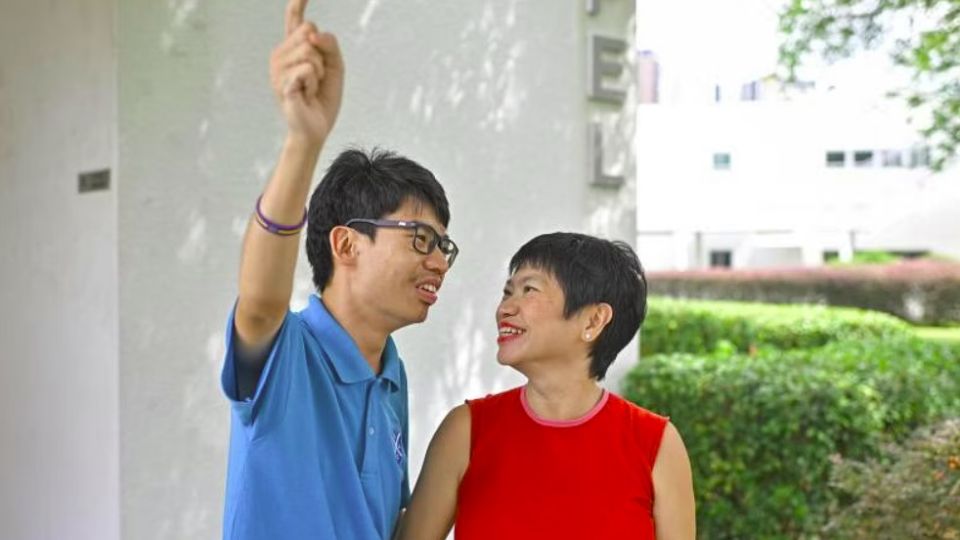July 16, 2024
SINGAPORE – Executive coach Sharon Lee, 52, is concerned about where her son, 27-year-old Lucas Tan, will live in the future.
Mr Tan, who has autism, lives with his parents and has been attending a day activity centre in Siglap since 2019.
It is his mother’s hope that he will live with one of her siblings when she is no longer around. If they are unable to care for him, she may have to arrange to put him in St Andrew’s Adult Home, a residential home designed and built for adults with autism.
However, she noted, there are more options overseas for individuals on the autism spectrum.
“In countries like the United Kingdom, adults with autism have the option of supported living in the community,” Ms Lee said.
“I feel this could work if the individual has some degree of independence, but it also needs a community to assist and intervene when necessary.”
In Singapore, service providers are similarly beginning to think about how care for this group of adults might evolve to solve the issue of their living arrangements as they age, especially after their caregivers are gone.
For instance, the Autism Resource Centre – which provides a wide range of services, such as early intervention, student enrichment and Pathlight School for individuals with autism – told The Straits Times it is developing a residential living programme for such individuals. It will share more details in due time.
Mr Bernard Chew, who is chief executive of St Andrew’s Autism Centre, said a different model of care could involve two to three adults with autism living together in a Housing Board flat.
Trained support staff could be deployed to such homes, and those with more severe needs could get more generous staffing ratios and round-the-clock support.
People who are able to secure employment can continue to contribute to the community through paid or even voluntary work, he added, while others can access different community facilities and live dignified and meaningful lives.
Mr Chew said it may not be helpful to just continue building more of the same facilities that already exist, including St Andrew’s Adult Home (Sengkang). This is part of St Andrew’s Autism Centre, which also runs a special education school and two day activity centres.
Instead, it is important to examine the fundamental question of what service model can allow adults with autism to age with dignity and meaning, he said.
“As more adults with autism graduate from special education and mainstream schools, and their caregivers also start to age, there is a need to be looking further ahead to re-envision what kind of life an adult with autism should be living in a truly inclusive society,” Mr Chew said.
About 7,000 adults with autism aged 18 and above are known to the Ministry of Social and Family Development (MSF) and disability agency SG Enable, as they have applied for or enrolled in disability support schemes or programmes.
The overall number of people with autism in Singapore is not known, as there are those who remain undiagnosed or who have not subscribed to any services or initiatives.
When students with autism turn 18 and graduate from special education schools, they face what industry professionals call the “post-18 cliff effect”, where services drop off and they find limited support to cater to their needs. Some may move to one of 11 MSF-funded adult disability homes for long-term residential care.
Dr Eunice Tan, head of special education at the Singapore University of Social Sciences’ S R Nathan School of Human Development, said adults with milder needs should be able to adapt and adjust to living in the community with some support. This includes living in HDB flats with proper care staff involved.
Those with higher support needs should have options so that they do not have to live in institutions too, added Dr Tan, who has an adult son with autism.
“Many parts of the world, like Canada, are no longer on an institution model. It is about inclusion and being part of the community by participating in activities, regardless of how challenged a person is,” she said.
She is adamant that her son will not be placed in institutions such as homes for adults with disabilities, as she fears his quality of life will be impacted negatively.
“It is at the back of many parents’ minds how to provide the best possible life for the adult child once they are unable to take care of them or when they pass on,” Dr Tan said.
MSF said families of people with disabilities have expressed through engagement sessions that they wish for their loved ones to stay in the community.
It added that it works with social service agencies, caregivers and people with disabilities to come up with options that support their needs and goals for community living. These include day activity centres and sheltered workshops.
The first Enabling Services Hub was launched in Tampines in 2023, with two more in the pipeline by 2025 to bring disability support services closer to homes.
Under the Enabling Masterplan 2030, the Taskforce for Developing New Community Living Models for Persons with Disabilities was also set up to explore how Singapore could enhance and extend the current range of support for people with disabilities to live well in the community across life stages.
“The task force will be releasing its recommendations later this year,” said an MSF spokesperson.
Mr Ng Kin Sze, 68, is the sole caregiver of his 33-year-old daughter, Jia Ming, who has autism. The private equity adviser, who is divorced, hopes that current provisions for adults with autism will be improved.
Ms Ng does not talk and cannot care for herself. She has been a resident at St Andrew’s Adult Home in Compassvale Bow since 2022.
“Many adults with autism would need long-term care as their caregivers grow old, and this is in short supply relative to the need,” Mr Ng said.


